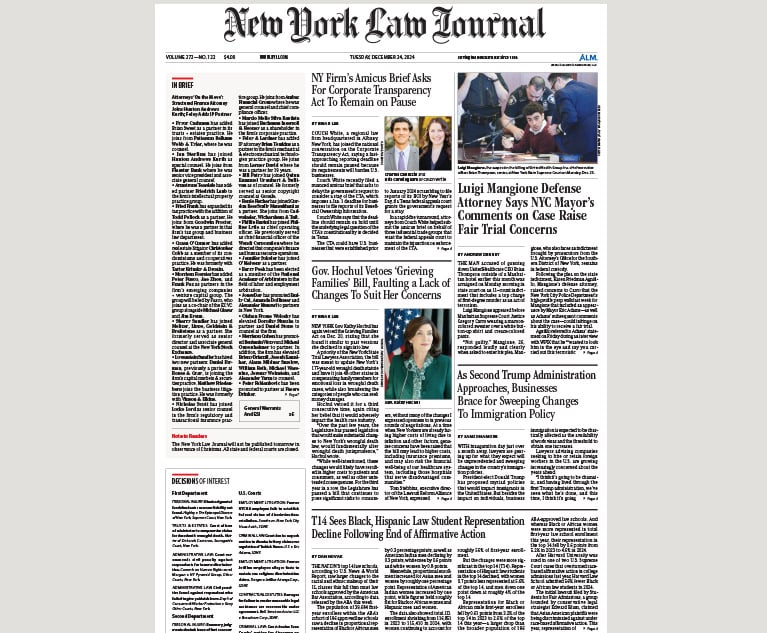 Schulte Roth & Zabel offices in Washington, D.C. Photo: Diego M. Radzinschi/ALM
Schulte Roth & Zabel offices in Washington, D.C. Photo: Diego M. Radzinschi/ALMSchulte Beats Legal Malpractice Suit Tied to Postnuptial Agreement Drafted by Partner
The lawsuit against Schulte and Susan Frunzi, a partner concentrating on estate planning, among other areas, was lodged in 2018 by Jordan Seaman, who alleged that he incurred millions of dollars in damages based on being misled by Frunzi. The appeals court dismissed the malpractice action, saying no attorney-client relationship had been established for the work in question.
October 21, 2019 at 10:48 AM
5 minute read
A legal malpractice action against Schulte Roth & Zabel, linked to one of the firm's partners drafting a postnuptial agreement between a sometimes client of the firm and that man's wife, must be dismissed because there was "no attorney-client relationship" established for the postnuptial agreement work, a state appeals court ruled.
"The course of conduct among the parties demonstrated by the documentary evidence, particularly the repeated communications from defendants [Schulte Roth & Zabel and Schulte partner Susan Frunzi] to plaintiff clearly disclaiming an attorney-client relationship and advising plaintiff and his wife to consult independent counsel, refute plaintiff's general allegations that Frunzi was his attorney in connection with the negotiation and execution of the postnuptial agreement," wrote the Appellate Division, First Department in its dismissal opinion.
The lawsuit against the firm and Frunzi, a New York-based partner who concentrates on estate planning, among other areas, was lodged in March 2018 by Jordan Seaman, who alleged that he incurred millions of dollars in damages based on being misled by Frunzi.
Seaman, whose family is tied to the now-defunct Seaman Furniture Co., claimed in his suit that he and this then-wife, Rebecca Colin, had asked Frunzi in 2014 to prepare an agreement in which he'd contribute to the cost of a new house for his wife.
According to Seaman's complaint and court records, the couple were separated and living in different residences at the time, and Seaman believed that his financial obligations under the agreement would terminate if the couple divorced.
In addition, he allegedly told Frunzi that he didn't want the terms of an existing prenuptial agreement between he and Colin to change.
Seaman further claimed in his lawsuit that he was informed by Frunzi, after he signed the final draft of the postnuptial agreement, that the agreement actually imposed a lifetime financial obligation on him that survived the divorce.
"The lawyer does not inform the husband that the new draft imposes this obligation," Seaman's complaint states at one point, adding, "She does not flag it for him or explain it to him. … The result is that the lawyer duped one of her clients (the husband) in favor of the other (the wife)."
In another related allegation, Seaman said that he learned during later divorce proceedings with Colin that Frunzi had failed to disclose that she personally was an active trustee "of two extremely valuable trusts" for Colin's benefit.
Colin, the daughter of real estate developer Fred Colin, was also a sometimes client of Frunzi's in the past, court records say.
But in affirming Manhattan Supreme Court Justice Robert Kalish's 2018 dismissal of Seaman's malpractice lawsuit, a unanimous First Department panel wrote that "the law is well-established that 'the absence of any attorney-client relationship bars an action for attorney malpractice,'" quoting Cabrera v. Collazo, 115 A.D.3d 147.
In the Oct. 17 opinion, panel Justices Sallie Manzanet-Daniels, Judith Gische, Troy Webber and Peter Moulton further noted that "an unambiguous written agreement can also constitute documentary evidence," and wrote that "documentary evidence, particularly the repeated communications from defendants to plaintiff clearly disclaiming an attorney-client relationship and advising plaintiff and his wife to consult independent counsel, refute plaintiff's general allegations that Frunzi was his attorney in connection with the negotiation and execution of the postnuptial agreement."
Kalish, who dismissed Seaman's lawsuit from the bench after hearing oral arguments regarding dismissal in October 2018, according to a proceedings transcript cited by a 2018 New York Law Journal article, said that Seaman "was repeatedly advised on approximately 11 separate occasions to review the [postnuptial] agreement with his own attorney."
In motion to dismiss-related papers filed by Schulte in the lawsuit, the firm quotes what it calls a "Non-Representation Clause" found in the March 3, 2015, version of the postnuptial agreement.
The quoted language states in part, "Schulte Roth & Zabel LLP did not represent either of the Parties [Seaman or Colin] in connection with the negotiation and preparation of this Agreement."
Later in the clause, it states, "Schulte Roth & Zabel LLP has represented the Parties independently in the past and will continue to represent each of them on personal matters, as they each may do so from time to time."
Illan Maazel, an Emery Celli Brinckerhoff & Abady partner in Manhattan, represented Seaman in the appeal before the First Department, according to the panel's decision. He could not be reached on Friday for comment.
Robert Abrahams, a Manhattan-based of counsel at Schulte, represented the law firm and Frunzi, according to the opinion. He also could not be reached Friday.
Frunzi is considered a top trusts and estates partner at Schulte, and is a member of the firm's executive committee.
This content has been archived. It is available through our partners, LexisNexis® and Bloomberg Law.
To view this content, please continue to their sites.
Not a Lexis Subscriber?
Subscribe Now
Not a Bloomberg Law Subscriber?
Subscribe Now
NOT FOR REPRINT
© 2024 ALM Global, LLC, All Rights Reserved. Request academic re-use from www.copyright.com. All other uses, submit a request to [email protected]. For more information visit Asset & Logo Licensing.
You Might Like
View All

As Second Trump Administration Approaches, Businesses Brace for Sweeping Changes to Immigration Policy

As 'Red Hot' 2024 for Legal Industry Comes to Close, Leaders Reflect and Share Expectations for Next Year
7 minute readTrending Stories
- 1The Key Moves in the Reshuffling German Legal Market as 2025 Dawns
- 2Social Media Celebrities Clash in $100M Lawsuit
- 3Federal Judge Sets 2026 Admiralty Bench Trial in Baltimore Bridge Collapse Litigation
- 4Trump Media Accuses Purchaser Rep of Extortion, Harassment After Merger
- 5Judge Slashes $2M in Punitive Damages in Sober-Living Harassment Case
Who Got The Work
Michael G. Bongiorno, Andrew Scott Dulberg and Elizabeth E. Driscoll from Wilmer Cutler Pickering Hale and Dorr have stepped in to represent Symbotic Inc., an A.I.-enabled technology platform that focuses on increasing supply chain efficiency, and other defendants in a pending shareholder derivative lawsuit. The case, filed Oct. 2 in Massachusetts District Court by the Brown Law Firm on behalf of Stephen Austen, accuses certain officers and directors of misleading investors in regard to Symbotic's potential for margin growth by failing to disclose that the company was not equipped to timely deploy its systems or manage expenses through project delays. The case, assigned to U.S. District Judge Nathaniel M. Gorton, is 1:24-cv-12522, Austen v. Cohen et al.
Who Got The Work
Edmund Polubinski and Marie Killmond of Davis Polk & Wardwell have entered appearances for data platform software development company MongoDB and other defendants in a pending shareholder derivative lawsuit. The action, filed Oct. 7 in New York Southern District Court by the Brown Law Firm, accuses the company's directors and/or officers of falsely expressing confidence in the company’s restructuring of its sales incentive plan and downplaying the severity of decreases in its upfront commitments. The case is 1:24-cv-07594, Roy v. Ittycheria et al.
Who Got The Work
Amy O. Bruchs and Kurt F. Ellison of Michael Best & Friedrich have entered appearances for Epic Systems Corp. in a pending employment discrimination lawsuit. The suit was filed Sept. 7 in Wisconsin Western District Court by Levine Eisberner LLC and Siri & Glimstad on behalf of a project manager who claims that he was wrongfully terminated after applying for a religious exemption to the defendant's COVID-19 vaccine mandate. The case, assigned to U.S. Magistrate Judge Anita Marie Boor, is 3:24-cv-00630, Secker, Nathan v. Epic Systems Corporation.
Who Got The Work
David X. Sullivan, Thomas J. Finn and Gregory A. Hall from McCarter & English have entered appearances for Sunrun Installation Services in a pending civil rights lawsuit. The complaint was filed Sept. 4 in Connecticut District Court by attorney Robert M. Berke on behalf of former employee George Edward Steins, who was arrested and charged with employing an unregistered home improvement salesperson. The complaint alleges that had Sunrun informed the Connecticut Department of Consumer Protection that the plaintiff's employment had ended in 2017 and that he no longer held Sunrun's home improvement contractor license, he would not have been hit with charges, which were dismissed in May 2024. The case, assigned to U.S. District Judge Jeffrey A. Meyer, is 3:24-cv-01423, Steins v. Sunrun, Inc. et al.
Who Got The Work
Greenberg Traurig shareholder Joshua L. Raskin has entered an appearance for boohoo.com UK Ltd. in a pending patent infringement lawsuit. The suit, filed Sept. 3 in Texas Eastern District Court by Rozier Hardt McDonough on behalf of Alto Dynamics, asserts five patents related to an online shopping platform. The case, assigned to U.S. District Judge Rodney Gilstrap, is 2:24-cv-00719, Alto Dynamics, LLC v. boohoo.com UK Limited.
Featured Firms
Law Offices of Gary Martin Hays & Associates, P.C.
(470) 294-1674
Law Offices of Mark E. Salomone
(857) 444-6468
Smith & Hassler
(713) 739-1250







